|
|
|
Sort Order |
|
|
|
Items / Page
|
|
|
|
|
|
|
| Srl | Item |
| 1 |
ID:
142225
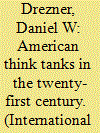

|
|
|
|
|
| Summary/Abstract |
Think tanks have been a part of the United States’ foreign policy establishment for more than a century. They have played a significant role at key junctures in US foreign policy. Two inflection points, however, have dramatically altered the think tank landscape in the last 15 years. The 11 September 2001 terrorist attacks caused these organizations to dramatically expand their staff and overhead, as the demand for their services increased. The 2008 financial crisis subsequently left many of these same think tanks financially overextended. This circumstance forced these organizations to seek out more unconventional funding arrangements, imposing new constraints at the exact moment that their competitive environment intensified. In the twenty-first century, US foreign policy think tanks will maintain their relevancy by moving beyond what made them relevant in the last century.
|
|
|
|
|
|
|
|
|
|
|
|
|
|
|
|
| 2 |
ID:
100532
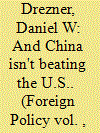

|
|
|
| 3 |
ID:
091422
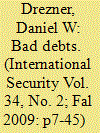

|
|
|
|
|
| Publication |
2009.
|
| Summary/Abstract |
Commentators and policymakers have articulated growing concerns about U.S. dependence on China and other authoritarian capitalist states as a source of credit to fund the United States' trade and budget deficits. What are the security implications of China's creditor status? If Beijing or another sovereign creditor were to flex its financial muscles, would Washington buckle? The answer can be drawn from the existing literature on economic statecraft. An appraisal of the ability of creditor states to convert their financial power into political power suggests that the power of credit has been moderately exaggerated in policy circles.
|
|
|
|
|
|
|
|
|
|
|
|
|
|
|
|
| 4 |
ID:
168923


|
|
|
|
|
| Summary/Abstract |
Since the onset of the 2008 financial crisis, there has been a running debate among international relations scholars about the future of the open liberal economic order. In many ways, however, this debate has generated more heat than light. Little thought has been given to considering the theory and process of great-power revisionism in the global political economy. In the presence of an existing hegemonic order, how would a rational revisionist develop a viable, peaceful counter-hegemonic strategy? This paper considers what a counter-hegemonic approach would look like in the absence of a great-power war. Building on Susan Strange’s concept of structural power, this paper concludes that there is an optimal revisionist sequence to challenge a hegemonic economic order. Such a sequence prioritizes attacking the ideational dimensions of the order before its material dimensions.
|
|
|
|
|
|
|
|
|
|
|
|
|
|
|
|
| 5 |
ID:
104864
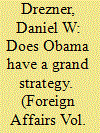

|
|
|
| 6 |
ID:
169186
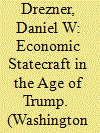

|
|
|
| 7 |
ID:
105089


|
|
|
|
|
| Publication |
2011.
|
| Summary/Abstract |
According to the New Yorker, Barack Obama boned up on international affairs to prepare for the presidency by reading Thomas Friedman. For foreign-policy cognoscenti, this is like reading John Grisham novels to study for the bar exam. With most of the Republican 2012 wannabes, like Obama, having spent their careers focused on domestic issues (or in the case of Donald Trump, the Miss USA pageant), it seemed only fair for FP to help these international relations neophytes. So we asked an array of seasoned foreign-policy professionals and general smart folks to provide reading suggestions for our aspiring leaders. The one obvious conclusion? All roads to understanding American foreign policy run through Joe Nye.
|
|
|
|
|
|
|
|
|
|
|
|
|
|
|
|
| 8 |
ID:
187644
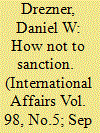

|
|
|
|
|
| Summary/Abstract |
In the past century economic sanctions have emerged as a prominent ‘off the shelf’ tool of diplomacy. This article examines two of the most high-profile failures in the history of economic sanctions: the United Nations sanctions against Iraq between the two Gulf wars, and the Trump administration's re-imposition of sanctions on Iran beginning in 2018. The technology of economic statecraft changed considerably between these two cases, indicating significant policy learning. In both instances, however, the sanctions imposed crippling costs on the target state without any observable concessions. In neither case was the primary goal achieved, and the negative policy externalities were considerable. An autopsy of these failures reveals three cautionary warnings. First, the recipe for sanctions success is not merely a function of the ability to impose costs on the target state. Second, an underappreciated impediment to the successful use of economic statecraft is a failure to articulate clear and consistent demands. Third, tight linkages between scholars and policy-makers can lead to improved policies in the short term, but long-term political imperatives within great powers can pervert such successes.
|
|
|
|
|
|
|
|
|
|
|
|
|
|
|
|
| 9 |
ID:
171195
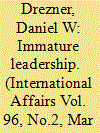

|
|
|
|
|
| Summary/Abstract |
There has been a renaissance in the study of how the backgrounds of individual leaders affect foreign policy outcomes. Donald Trump's presidency highlights the limits of this approach. Trump's psychology is so unique, and so akin to that of a small child, that studying his background alone is insufficient to explain his decision-making. The evidence for this characterization of Trump's leadership comes not from his political opponents, but his allies, staffers and subordinates. Trump's lack of impulse control, short attention span and frequent temper tantrums have all undercut his effectiveness as president as compared to his predecessors. Nonetheless, the 45th president helps to clarify ongoing debates in American politics about the relative strength of the presidency as an institution. In particular, the powers of the presidency have become so enhanced that even comparatively weak and inexperienced leaders can execute dramatic policy shifts. The formal checks on presidential power, from the legislative, judicial and executive branches have all eroded. Similarly, the informal checks on the presidency had also degraded before Trump's inauguration. This article uses Trump's presidency—and his severe limitations as a decision-maker—to highlight the ways in which even a weak leader can affect change by holding a powerful office.
|
|
|
|
|
|
|
|
|
|
|
|
|
|
|
|
| 10 |
ID:
187642


|
|
|
|
|
| Summary/Abstract |
In the century of International Affairs' existence, there have been a lot of catastrophic critical junctures when a different policy decision, underpinned by an alternative epistemic framing, might have led to a more peaceful and prosperous world. In this special issue, we consider the well-intentioned efforts of humanity over the past century that turned out badly. Much of foreign policy analysis seeks to replicate successes; we humbly ask whether it might make more sense to examine how to avoid disastrous failure. In this introductory article we develop a concrete definition of policy failure and provide a motivation for why the study of failures is relevant for the coming century. We suggest a Hippocratic Oath for policy-minded scholars, and advance guidelines to help go beyond Barack Obama's ‘Don't do stupid shit’ injunction and also guard against potential policy paralysis. Finally, we offer conclusions derived from the other articles in this special issue that are relevant for both the study and practice of international relations. Armed with these insights, practitioners—and the researchers who advise them—may stand a better chance of avoiding some of the worst pitfalls of international relations; occasionally, together, we may even get some things right.
|
|
|
|
|
|
|
|
|
|
|
|
|
|
|
|
| 11 |
ID:
097844
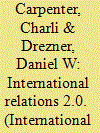

|
|
|
|
|
| Publication |
2010.
|
| Summary/Abstract |
The International Relations (IR) profession has not fully taken stock of the way in which user-driven information technologies-including Blogger, Facebook, Twitter, YouTube, and Wikipedia-are reshaping our professional activities, our subject matter, and even the constitutive rules of the discipline itself. In this study, we reflect on the ways in which our own roles and identities as IR scholars have evolved since the advent of "Web 2.0": the second revolution in communications technology that redefined the relationship between producers and consumers of online information. We focus on two types of new media particularly relevant to the practice and the profession of IR: blogs and social networking sites.
|
|
|
|
|
|
|
|
|
|
|
|
|
|
|
|
| 12 |
ID:
122085
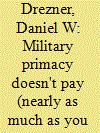

|
|
|
|
|
| Publication |
2013.
|
| Summary/Abstract |
Acommon argument among scholars and policymakers is that America's military preeminence and deep international engagement yield significant economic benefits to the United States and the rest of the world. Ostensibly, military primacy, beyond reducing security tensions, also encourages economic returns through a variety of loosely articulated causal mechanisms. A deeper analytical look reveals the causal pathways through which military primacy is most likely to yield economic returns: geoeconomic favoritism, whereby the military hegemon attracts private capital in return for providing the greatest security and safety to investors; direct geopolitical favoritism, according to which sovereign states, in return for living under the security umbrella of the military superpower, voluntarily transfer resources to help subsidize the costs of hegemony; and the public goods benefits that flow from hegemonic stability. A closer investigation of these causal mechanisms reveals little evidence that military primacy attracts private capital. The evidence for geopolitical favoritism seems more robust during periods of bipolarity than unipolarity. The evidence for public goods benefits is strongest, but military predominance plays only a supporting role in that logic. While further research is needed, the aggregate evidence suggests that the economic benefits of military hegemony have been exaggerated in policy circles. These findings have significant implications for theoretical debates about the fungibility of military power and should be considered when assessing U.S. fiscal options and grand strategy for the next decade.
|
|
|
|
|
|
|
|
|
|
|
|
|
|
|
|
| 13 |
ID:
077899


|
|
|
| 14 |
ID:
076418


|
|
|
|
|
| Publication |
2007.
|
| Summary/Abstract |
Controversies over the war in Iraq and U.S. unilateralism have overshadowed a more pragmatic and multilateral component of the Bush administration's grand strategy: its attempt to reconfigure U.S. foreign policy and international institutions in order to account for shifts in the global distribution of power and the emergence of states such as China and India. This unheralded move is well intentioned and well advised, and Washington should redouble its efforts.
|
|
|
|
|
|
|
|
|
|
|
|
|
|
|
|
| 15 |
ID:
084337
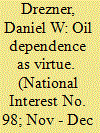

|
|
|
|
|
| Publication |
2008.
|
| Summary/Abstract |
Imagine a world free of oil-one with diversified Arab economies divorced from the dollar, African nations devoid of the resource curse, and China and India ascendant. As it turns out, a world without oil dependence is a world that doesn't need an American superpower.
|
|
|
|
|
|
|
|
|
|
|
|
|
|
|
|
| 16 |
ID:
186918


|
|
|
| 17 |
ID:
103256


|
|
|
|
|
| Publication |
2011.
|
| Summary/Abstract |
This essay reviews the literature and origins of the targeted sanctions framework. The development of smart sanctions has solved many of the political problems that prior efforts at comprehensive trade sanctions had created. In so doing, the idea of smart sanctions served as a useful focal point for policy coordination among key stakeholders. Nevertheless, there is no systematic evidence that smart sanctions will yield better policy results vis-à-vis the targeted country. Indeed, in many ways, the smart sanctions framework has been too successful. It would behoove policymakers and scholars to look beyond the targeted sanctions framework to examine the conditions under which different kinds of economic statecraft should be deployed.
|
|
|
|
|
|
|
|
|
|
|
|
|
|
|
|
| 18 |
ID:
085702
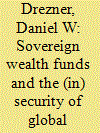

|
|
|
| 19 |
ID:
128268
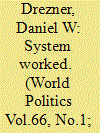

|
|
|
|
|
| Publication |
2014.
|
| Summary/Abstract |
Prior to 2008, numerous international relations scholars had predicted a looming crisis in global economic governance. Policy analysts have only reinforced this perception since the financial crisis, declaring that we live in a "G-Zero" world. This article takes a closer look at the global response to the financial crisis and reveals a more optimistic picture. Despite initial shocks that were more severe than the 1929 financial crisis, global economic governance structures responded quickly and robustly. Whether one measures results by outcomes, outputs, or process, formal and informal governance structures displayed surprising resiliency. Multilateral economic institutions performed well in crisis situations to reinforce open economic policies, especially in contrast to the 1930s. While there are areas where governance has either faltered or failed, on the whole, the system has worked. Misperceptions about global economic governance persist because the Great Recession has disproportionately affected the core economies; analysts have conflated national with global governance; and the efficacy of past periods of global economic governance has been badly overestimated. Why the system has worked better than expected remains an open question, but we can tentatively conclude that both the power of the United States and the resilience of neoliberal economic ideas were underestimated.
|
|
|
|
|
|
|
|
|
|
|
|
|
|
|
|
| 20 |
ID:
167199


|
|
|
|
|
| Summary/Abstract |
This article reflects on the role that technological change has played in the last century on international relations. It makes two main points. First, the relationship is reciprocal; while technological change has undeniable effects on international relations, the changing nature of world politics also affects the pace of technological change. Second, any technological change is also an exercise in economic redistribution and societal disruption. It creates new winners and losers, alters actor preferences, and allows the strategic construction of new norms and organizations. The nature of the technology itself, and the extent to which the public sector drives the innovation, generates differential effects on international relations. To demonstrate these arguments, special emphasis is placed on two important innovations of the last century for international relations: nuclear weapons and the Internet.
|
|
|
|
|
|
|
|
|
|
|
|
|
|
|
|
|
|
|
|
|